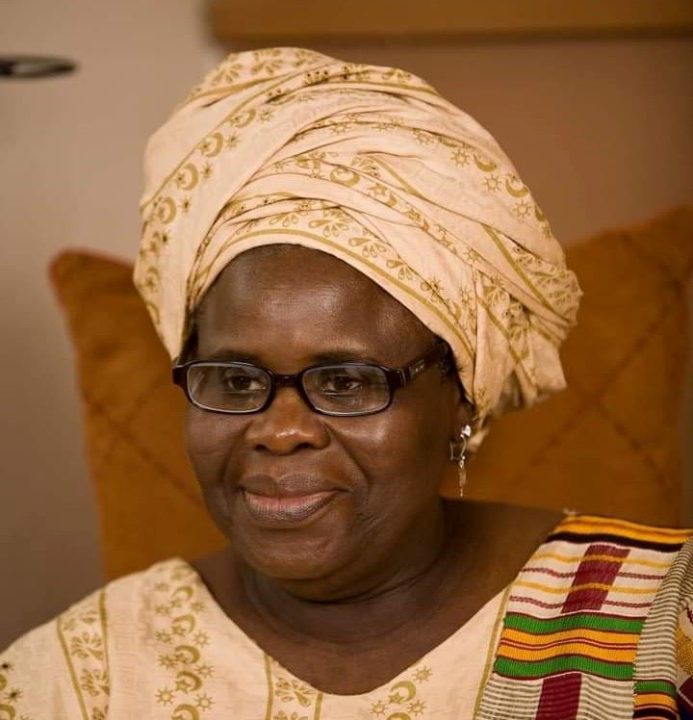Professor Ama Ata Aidoo, a renowned Ghanaian author, poet and playwright has passed on at age 81.
Prof Ata Aidoo who has had an illustrious career spanning over five decades died on Wednesday morning May 31, 2023.
Kwamena Essandoh, the family head in a statement said: “The Family of Prof. Ama Ata Aidoo with deep sorrow but in the hope of the resurrection, informs the general public that our beloved relative and writer passed away in the early hours of this morning Wednesday 31st May 2023, after a short illness.
“Funeral arrangements would be announced in due course. The Family requests privacy at this difficult moment.”
Prof Ama Ata Aidoo was recognised as one the most prominent African writers of the 20th and 21st centuries.
The writer, whose work, written in English, emphasised the paradoxical position of the modern African woman.
Over the seven decades of her career, Ghanaian writer Ama Ata Aidoo has published award-winning novels, plays, short stories, children’s books, and poetry, and influenced generations of African women writers.
Before Chimamanda Ngozi Adichie of the award-winning bestselling novels and viral TED talks, before Doreen Baingana, Helen Oyeyemi, Sefi Atta, Taiye Selasi, NoViolet Bulawayo and any other of the number of rising female literary stars out of Africa, Aidoo was blazing trails.
In fact, in her endorsement of Aidoo’s most recent book, Adichie writes “I occupy the space of a ‘Black African Happy Feminist’ because writers like Ama Ata Aidoo came before me. Her storytelling nurtured mine. Her worldview enlarged and validated mine.”
In further testament to her influence, the author was the subject of the excellent 2014 documentary film, The Art of Ama Ata Aidoo, directed by Yaba Badoe.
Her accomplishments have been heralded in Essays in Honour of Ama Ata Aidoo at 70: A Reader in African Cultural Studies, edited by Anne V. Adams.
Aidoo was born as Christina Ama Aidoo into a royal Fanti family in Ghana in 1942.
In Badoe’s documentary, the author, in her traditional head wrap, dangly earrings, and Chanel sunglasses, remembers her mother telling her stories in the early hours of the morning during her childhood.
Her interest in storytelling was also influenced by the semi-professional storyteller who lived in her village.
“We’d sit down and he’d just tell us stories,” Aidoo recalls. Normal life in the village also lent much to a young girl’s imagination.
“There were stories and happenings and stuff,” she says in the film, such as wandering prophets.
“Once I became aware of myself, it occurred to me that I should add to the world’s stories.”
Her father was an advocate of Western education, and sent her to the Wesley Girls’ High School in Cape Coast from 1961 to 1964.
When she was in form three, the headmistress asked her what she planned to do with her future.
Aidoo replied that she wanted to be a poet. “Poetry doesn’t feed anyone, Christine,” the teacher told her.
Nevertheless she bought Aidoo an Olivetti typewriter to encourage her literary pursuits.
A few months later, Aidoo spotted a pair of pink shoes in a store.
Wanting to buy them but lacking the cash, she decided to enter a Christmas short story contest sponsored by the local newspaper, The Daily Graphic.
She wrote her entry in longhand and sent it in.
“On the 24th of December, my auntie and I were in the kitchen,” Aidoo says. “I opened the center page of the newspaper and saw my name.” With the money from her first publication, she bought the coveted pink shoes. She was 18 years old.
In 1964, Aidoo enrolled in the University of Ghana in Legon, where she found her “writer self.” Knowing that she wouldn’t be able to write stories “sounding like an English girl,” she set out to make her stories “as authentically African as possible.” While she was a student, she wrote her first play, The Dilemma of a Ghost, about a Ghanaian man who returns from a sojourn in the United States with an African-American wife, much to his family’s dismay.
The play, initially staged in 1965, was published the following year, making Aidoo the first published African woman dramatist.
Aidoo went on to write another play, Anowa, based upon an old Ghanaian legend and concerning the African slave trade, an issue which she insists African writers continue to ignore.
“The entire continent needs to go through some debriefing in order to go forward, but many Africans don’t want to deal with it.”
The play continues to resonate with Americans and was performed in 2012 by a multicultural cast at the University of California at Santa Barbara.
Aidoo has never been afraid of controversy. Her first novel, Our Sister Killjoy (1977), was inspired by her sojourn in London.
For Ghanaians, Aidoo says, going to Europe was “like a rehearsal for going to heaven.”
She wanted to burst that idealistic African notion of the West. In the novel, Sissie is disappointed by what she finds in London and Germany. She is further confused by the sexual overtures of her German friend, Marija.
Aidoo says that she has been attacked by both conservative Ghanaians for presenting same-sex relations in her work, and by lesbians for not exploring the issue more fully.
She insists that her portrayal of Sissie is not a judgment, but a reflection of her own naïveté as a young woman in Europe.
During her illustrious writing career, Aidoo has become well attuned to the challenges of balancing writing, mothering, and work for pay.
This is reflected in her story “Choosing—a moral from the world of work,” collected in The Girl Who Can and Other Stories, which begins: Once upon a time, there was a writer who couldn’t write because she thought she had too many problems.
The main one being financial. So one day, she decided she would go and do other things from which she could make money more quickly.
That way, she would be able to solve her problems, since half of them had to do with the fact that she never had enough money to solve her problems.
Although the writer in the story turns to teaching and then trading, ultimately abandoning both, Aidoo has spent much of her career in academia.
Her first position, immediately after graduation from college, was as a junior research fellow at the Institute of African Studies at the University of Ghana.
She has also served as a visiting professor and distinguished visiting professor to the English, African, and American Studies departments of several universities and colleges in the United States, including, most recently, Brown University.
In 1982 she was appointed minister of education in Ghana, making her the first woman to hold that position.
In her role, she helped to earn greater respect for female teachers, but she was forced to put writing on a backburner while she was assumed to participate in more important matters.
“As usual,” she says, “it was my mother who was aware of the fact that I should be writing.”
Frustrated by her inability to effect change and by her desire to write, she left her post after only 18 months.
Throughout her career, Aidoo has been unabashedly feminist. Women in general, and mothers and daughters in particular, figure prominently in her work.
This is hardly surprising as Aidoo got the idea for her first play from a story told by her mother, and was herself the single mother of a daughter. In her story, “Choosing,” the Writer-Turned-Teacher-Turned-Trader frequently asks her mother for advice, although she doesn’t always follow it. “
Outfoxed,” in her latest collection, Diplomatic Pounds & Other Stories, recounts a contentious mother-daughter relationship: Esaaba, believing that she is finally in a position to win her mother’s respect, travels to visit her only to find that she has died, seemingly timing her death to spite her daughter.
Although mothers often appear as sources of wisdom in Aidoo’s novels and stories, her characters are sometimes ambivalent about motherhood. In her second novel, Changes: A Love Story, for example, the main character, Esi, leaves her child behind with her mother-in-law when she divorces her husband after a marital rape and becomes the second wife of another man.
Later in the book, Esi’s grandmother says, “I have had four children, and I know that each time a baby came out of me, I died a little.”
Although according to Aidoo, African women have never had a problem with Esi’s character, some Western readers have criticized her for being “selfish” and a “bad mother.” To this accusation, Aidoo says, “What else is new?” She maintains that “selfish people also have a right to be here.”
Aidoo herself wrote via email that she “made the decision to have only one child, because I didn’t think much of myself as a mother in practical terms. Even with my one daughter, I’ve always felt that I was not able to give her as much of my time and attention as I considered necessary. So having another child or more children was simply out of the question.”
While balancing the demands of single motherhood, a teaching career, and writing she “had a lot of help from paid workers and the extended family.”
In 2000, recognizing the needs of women writers, Aidoo established Mbaasem (which means “Women’s Words”), a foundation dedicated to promoting the work of Ghanaian and African women writers. She currently serves as executive director.
For women in Africa, Aidoo writes, “The main challenges are time to write and rooms of our/their own! Mbaasem was established with the hope of helping as many women writers as possible with these issues. Unfortunately, funding has been a colossal challenge, and the inadequate nature of it a major constraint on our hopes and aspirations.”
Nevertheless, this past spring the Mbaasem Foundation announced the winners of its writing contest for senior high school girls.
Ama Ata Aidoo will no doubt continue to inspire future generations.
Professor Ama Ata Aidoo is a Ghanaian author, playwright, and an accomplished poet. She is also the author of a number of children’s books.
She attended the Wesley Girls’ High School and received her bachelor of arts in English from the University of Ghana, where she wrote her first play, The Dilemma of a Ghost, in 1964. Her works of fiction particularly deal with the tension between Western and African world views. Many of her protagonists are women who defy the stereotypical women’s roles of their time.
Between 1964 and 1966 Ama was a Junior Research Fellow at the Institute of African Studies at the University of Ghana. In 1974, she became a consulting professor to the Phelps-Stokes Fund’s Ethnic Studies Program and was a fellow in Creative Writing at Stanford University.
She also served as a Research Fellow at the Institute of African Studies, and has taught at the English Departments of the Universities of Ghana and Cape Coast, and at Hamilton College in Clinton, New York.
She has served as a Visiting Professor in the African Studies Department at Brown University, USA. In January 1982 she was appointed Minister of Education, resigning after 18 months.
In 2000, Aidoo established Mbaasem, a foundation dedicated to promoting the work of Ghanaian and African women writers.
Her works include Dilemma of A Ghost, Our Sister Kill Joy, The Girl Who Can, and Changes, which won the 1992 Commonwealth Writers Prize for Best Book (Africa).
Her other works are Diplomatic Pounds and Other Stories and An Angry Letter in January and other poems. Her latest work is After the Ceremonies: New and Selected Poems.
- Friday April 26 2024 Newspaper Headlines - 26 April 2024
- Thursday April 25 2024 Newspaper Headlines - 25 April 2024
- Wednesday April 24 2024 Newspaper Headlines - 24 April 2024




